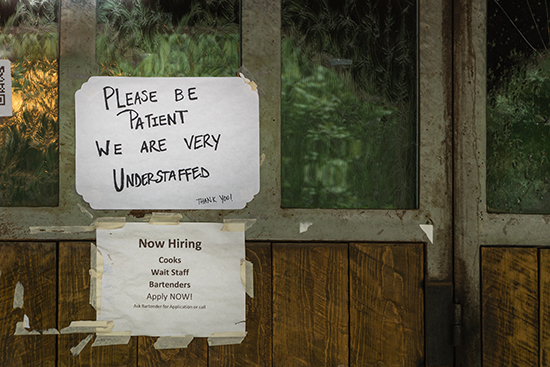

Features
Health & Safety
Recruitment
Retention
Labour shortage adds complexity to workplace vaccine mandates
By Jack Burton
 Many small and medium-sized businesses in Canada are currently having a difficult time finding new employees. (Heidi/Adobe Stock)
Many small and medium-sized businesses in Canada are currently having a difficult time finding new employees. (Heidi/Adobe Stock) With COVID-19 cases trending upward once again, the issue of vaccine passports and workplace vaccine initiatives has only gained more focus in the ongoing discourse around “back to work” protocols and building a safe and engaged staff amongst the turbulence of the pandemic.
In addition to a number of provinces implementing or announcing plans for everyday vaccine passports, workplace vaccine mandates have been announced for employees across numerous industries, such as long-term care home workers in Ontario and British Columbia along with those in federally-regulated transportation sectors.
These protocols do not come without their fair share of controversy, however.
Complexities stem not only from potential complications that these mandates can have regarding efficient implementation and compliance, but also due to the obstacles that they may pose for employers looking to retain or grow their workforce in a job market characterized by an increasingly problematic labour shortage.
Impact on staffing creates divisiveness
Despite the importance of vaccines in preventing the spread of COVID-19, data shows that the potential complications that vaccination mandates can have on workplaces has led to some reluctance and controversy amongst employers in implementing these policies.
A recent poll by the Canadian Federation of Independent Business (CFIB) illuminated the divisiveness of this issue, finding that 48 per cent of their 5,284 members surveyed supported vaccine mandates in their workplaces, with the number increasing to only 55 per cent when these mandates were framed as an alternative to increased lockdown measures.
Koula Vasilopoulos, district president of Western Canada and South America at Robert Half in Calgary, highlighted current staffing difficulties as one factor in this reluctance.
“When it comes to the impact of vaccine mandates on the current skills shortage as well as recruitment and retention, employers are already struggling to hire talent, and vaccine attestation adds one more hurdle in the recruiting and screening process.”
Among Robert Half’s clients, Vasilopoulos said that the commitment to a vaccinated workforce has manifested in the staffing process through a number of ways.
She noted instances of “employers pulling job offers late in the recruiting process if they find out a candidate isn’t vaccinated,” along with “companies considering ending contract assignments with candidates who aren’t and don’t plan to get vaccinated.”
While these initiatives help employers build toward a safer work environment, Vasilopoulos also pointed out ways that they can disrupt recruitment processes, including “(lengthening) the hiring process so accommodation issues can be explored,” such as increased masking and more regular testing, along with the added responsibility of employers having to “navigate accommodation issues and backfill the positions as needed.”
Making mandates an open conversation
With the nuances of this issue, along with the impact it can have on staffing during such a critical time, Vasilopoulos urged communication from employers, saying that, “in today’s talent-short market, setting expectations regarding vaccine requirements from the start is critical.”
Jasmin Guenette, vice-president of national affairs at the CFIB in Montreal, agrees that when it comes to the development and implementation of vaccination mandates in the workplace, especially in the context of the current state of recruitment and retention, fostering an open dialogue is key.
“Talk to your staff: have a meeting and listen to what they have to say, and be respectful to different points of view,” he said.
“Try to achieve your goal in ensuring a safe place to work, without adding any red tape or burdens of cost on your shoulders or that of your business and employees.”
An open discourse around vaccination mandates allows for a work environment that goes beyond just helping employers develop policies that reflect the safety needs of their staff – it allows those employees to feel heard and reaffirms their place as a part of the team, said Guenette.
“Really, it’s about having these conversations and figuring out how to have a safe place to work in, while having the engagement of your employees to make sure that the place is safe and everybody can do the work without worrying too much.”
Jack Burton is a freelance writer in Toronto.
Print this page